
April 5, 2009
 CR Sunday Feature: Ten Avenues For Buying Comics As Used Books
CR Sunday Feature: Ten Avenues For Buying Comics As Used Books

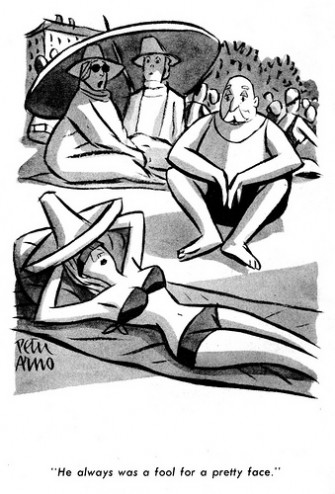 By Tom Spurgeon
By Tom Spurgeon
This is another post in a short series about buying comics during a recession, personal or worldwide. There may be more at some future date. Earlier installments were about emancipating yourself from the more extravagant inefficiencies of buying every week at the comic shop on point and about finding bargains via back-issue serial comics buying. While I was more interested in exploring the value of certain webcomics right now, the last two pieces on recommended comics on-line could also be seen as advice for consumers who are looking to find cheap or free sources of comics reading.

The great thing about re-focusing your comics reading from once-a-week purchases to a variety of strategies is that it opens up avenues both new from a single line of comics-buying, you can begin to explore comics-related purchases from a variety of locations. Some of them are new -- like your computer. But some are old. In the 1970s and early 1980s, before comics shops proliferate, a lot of comics buying to supplement one's newsstand habit was done at garage sales, flea markets and occasionally the used bookstore. The way a fat person can always buy shoes at a thrift shop, the comics fan has always been able to hit the humor section for books that if they aren't comics are likely to involved cartooning in some sense. Digging through bookstores is still great, when you can still find them, and of course most used booksellers are on-line now. The one web site were I've spent the most comics money over the last several years isn't
Midtown Comics, or
The Beguiling, or
Mile High Comics, or
MyComicShop.com, or
Global Hobo or even
Amazon.com, even though they're all great sites. What's received most of my money is
abebooks.com, the used bookstore inventory compiler, with occasional side trips into other, sometimes overlapping sites, like
bookfinder.com and even Amazon's used books listings.
The great thing is I've yet to spend more than $10 on any single book, and most of the time I spend less than $5. Just as
eBay has made a liar of many back-issue comic book mark-ups, on-line compilation listings for used books has revealed that many books exist in many different stores, and just because one store has it for $8.99 doesn't mean another won't carry it for $1.
I recommend that you add used bookstores to your mental list of places to find comics, cartoons and related materials. I think your comics purchasing may become richer for it. Here are ten types of books I look for every so often when I hit a bookstore's front door or I'm looking for a specific kind of reading experience on-line.
*****




 Vintage Gag Cartoon Collections
Vintage Gag Cartoon Collections
This is classic used bookstore buying, because not only were there a ton of such books published but they were the most natural fit into any bookstore's "humor collection." There are compilations, of course, but I like specific authors and look out for them as much as possible. There are dozens and dozens and dozens of such cartoon books, but a few of my favorite are:
Rowland Emett, the
Punch cartoonist eventually turned 3-D sculptor and model maker, who drew several lovely books featuring cartoons about trains;
Syd Hoff, whom I like for his ubiquity -- if you went to 10,000 lakehouses in 1968 and opened 10,000 baskets on 10,000 porches, it's likely 9800 would feature at least one Syd Hoff book pressed up against its lattice-work.
Chon Day was about as skilled as they come, and even has a feature character that will help you narrow your decision-making: the
Brother Sebastian cartoons.
Ted Key's work on
Hazel isn't just great fun to look at, there was a lot of it so much of it is cheap and it's one of the never talked about great cross-over successes in comics history. Finally,
Virgil Partch has managed to remain cool despite being very popular, a more impressive feat than you might imagine with very, very picky and sometimes status-conscious cartooning fans.
There are hundreds of similarly-skilled cartoonists out there, all waiting to be discovered and enjoyed.
*****



 The Great New Yorker Cartoonists, As Designated By My Dad
The Great New Yorker Cartoonists, As Designated By My Dad
In my
New Yorker-deferential household growing up, there were four
New Yorker cartoonists considered head and shoulders above the rest of them and by virtue of this had their own bookshelf in the living room. Luckily, all four were published in book form with great frequency, in volumes that would add to anyone's bookshelf take on comics and cartooning, today or 100 years from now.
Charles Addams' work had a wonderful look that no one's ever quite been able to capture, but what might surprise a lot of people reading the actual cartoons is how frequently funny they are.
James Thurber could barely draw in the traditional, angry-John-Buscema-fan-on-the-message-board sense, but his cartoons were almost always amusing and his voice came through. Most of his books contain a suite of cartoons, and there are some that are driven by the artwork -- he's also remained in print, so a lot of later iterations of those books are super, super cheap.
Saul Steinberg's mighty coffee table books like
The Passport were as much a part of Midwest middle class sophistication as season tickets to the local symphony orchestra. There are cheaper books of this late, walking dictionary of approaches to cartooning out there, too, but the bigger ones are well worth it.
Peter Arno shoots waves of handsome cartoon-making through history and out the pages of his always attractive books. His work was like regular cartooning dressed up in a tuxedo. I'm not always sure how his cartoons of sexually-tinged goofery will play to modern audience, but I always find him funny and "happy asshole" gags like the above I think translate very well.
*****



 All the Other New Yorker Cartoonists
All the Other New Yorker Cartoonists
I think
George Price,
Jean-Jacques Sempe and William Steig would make most great-cartoonists lists not assembled by my dad, but there are also a ton of compilations out there and any number of individual books. I like George Price more than I love him, but the cartooning is wonderful. I tend to look at Steig more through his children's book illustration, so I won't get into him here. For Jean-Jacques Sempe, master of remove, I recommend
the woefully under-appreciated Phaidon books of recent vintage more than the old stuff, but there's a certainly a ton of cheaper material out there to be sampled. I've had friends yell at me concerning what they feel is my completely undeserved affection for
Sam Gross, but that cover pictured above features what may still be my favorite title for a gag-cartoon collection
ever. In general I feel Gross captures as effectively as anyone ever did that more morbid, world-deflating sense of humor that think of when I think of William Shawn-era
New Yorker. (The newspaper's equivalent is
Jim Unger.) Helen Hokinson has a few books out there to be picked up, which is interesting in that she's a cartoonist of great historical interest that rarely gets more attention than this kind of nod. I like her sense of humor, though; it's not one you see anymore and you kind of have to adjust certain presumptions to take it as it was likely intended.
*****
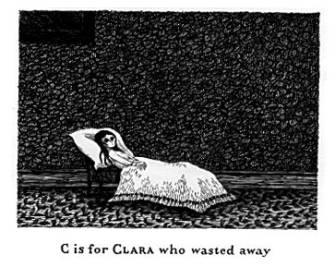
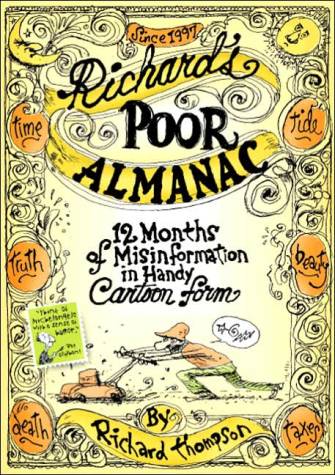
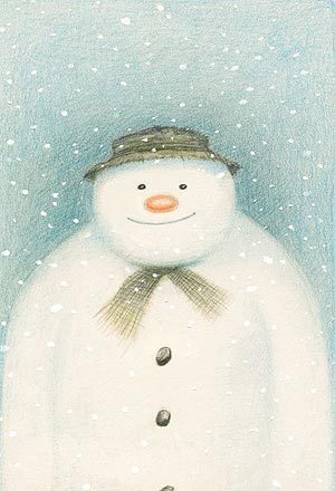
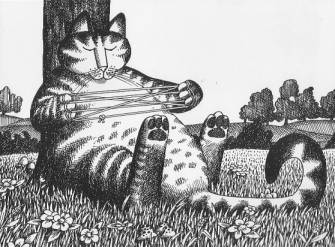
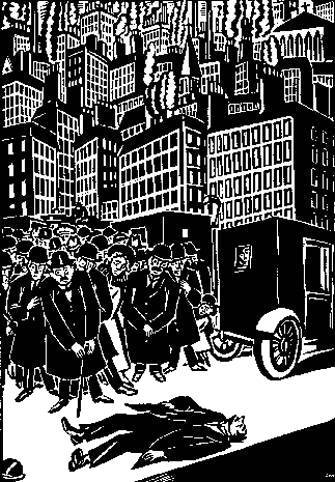
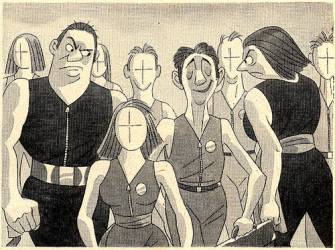
 Cartoon Books, Collections That People Don't Think Of As Collections, Proto-GNs
Cartoon Books, Collections That People Don't Think Of As Collections, Proto-GNs
By far the richest category in terms of its relation to comics and number of great works, there are simply dozens of books that we would called graphic novels or extended narratives were they to come out now but came out from book publishers as gag books, kids' works, comic strip collections or even novelty gift items. Edward Gorey is one of those great cartoonists to collect beyond his tremendous sense of humor and lovely overall look in that both the stand-alone books and the
Amphigorey compilations are equally worth your time. One of the reasons I'm so enthusiastic about Richard Thompson's newspaper strip
Cul De Sac is that I pretty much summarily dismissed his very, very funny
Richard's Poor Almanac collection that came out a long while back. Worst call ever.
RPA's not only a good book but a fairly compelling snapshot of the region of the country which Thompson calls home. Comics publishers are starting to dig into the catalog of
Raymond Briggs, but any number of his books are still out there to be picked up and have the reader declare, "this was a comic book," on the way to just liking them.
The great and mighty
B. Kliban was with Edward Gorey the comics that I shared most with friends going up. They were accessible, adult and funny. While I believe any and all Kliban-related posthumous publishing plans remain up in the air, I get the sense that a number of publishers would have done a giant book of as much comics-material they could stuff in as possible if that were currently possible. A gigantic figure of modern comedy. Many of the woodcut artists like
Lynd Ward and
Frans Masereel have been published once or twice in modern iterations that may be much cheaper to find than the original, rare copies. The great
Abner Dean was ostensibly a humor cartoonist but his work was weird and their artistic message often extended beyond individual cartoons to a series or group -- he was an unforgettable talent. Finally, the late
Anne Cleveland's best work was an extended meditation on life in Japan made up of mostly single moments, and yet the overall effect is greater than the sum of its parts.
It's Better With Your Shoes Off was also published like 8 billion times, which means some edition should be affordable.
*****
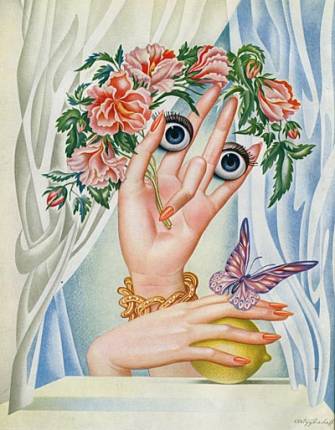
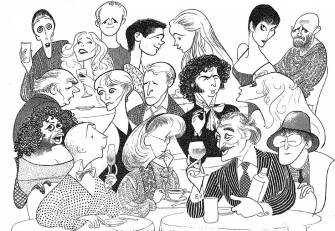
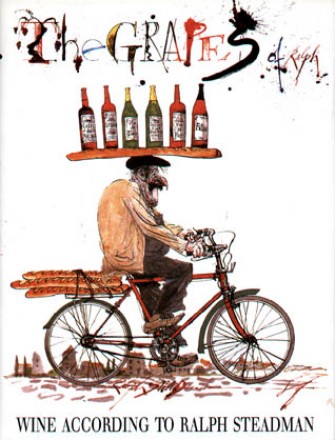 Art All By Itself
Art All By Itself
This is another category where you could list hundreds and hundreds of books, but it's probably worth remembering just how many illustrators near and dear to the collective comics zeitgeist have works out that are easily available.
Boris Artzybasheff may have done his best work for magazines, but I've seen a book here and there worth picking up. Some of
Al Hirschfeld's books I think cross the line into explorations of a scene or a place in a way that they essentially function as comics. Although caricature represents in some folks minds a completely different approach to visualization that has little to do with cartooning, I think there's a lot to be learned by looking at all those lines and some of the design solutions.
Ralph Steadman's work is dear to an entire generation of art fans and first-person journalists, and that it communicates to both groups in equal measure seems to me the secret of its success.
There are like 10 billion others. I guess what I'd say here is that don't let thinking about the comics buy keep you buying supportive material featuring art minus any and all narratives.
*****
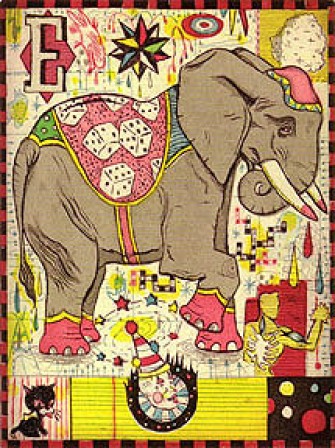



 Kids Books Done By Cartoonists
Kids Books Done By Cartoonists
Sometimes there are stand-alone kids books that are little sought-out by comics people but seem to me perfectly suited for them. I don't know why one of these new parents in a position of pride at an alt-comics companies has yet to steal the idea of
Tony Fitzpatrick's
Max & Gaby's Alphabet and done either a many-artist or series of single-artist alphabet primers. Who wouldn't want to buy that? I recommend the
William Steig-drawn children's books to everyone, as well as
Lorenzo Mattotti's and Richard McGuire's: there's a quality to the art that transcends any disconnect between you and the intended audience.
For the most part, however, I think this is a category of books that you're better off getting into on your own. If you're a fan of a particular cartoonist, do yourself the favor of searching one of the bookstore engines for any kids' books they might have done. I found some really cool-looking Jack Davis history books this way, like
Meet Abraham Lincoln. It's not exactly the same as reading their comics; it's more like seeing favorite film actor on stage: a potentially great experience in and of itself and filled with insight you can take back to your reading of their comics works.
*****
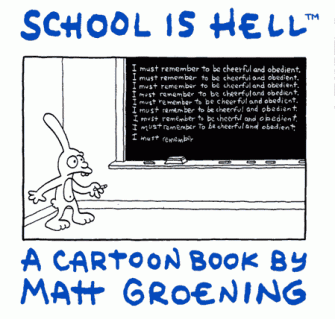

 Out Of Circulation Comics Collections
Out Of Circulation Comics Collections
There aren't a whole lot of straight-up comics collections that were much more prevalent on bookstore shelves that the DM-focused publishers haven't gone back to either help comic shops feature them or re-publish them themselves for that market. Works from
Lynda Barry and
Matt Groening pretty much qualify -- although I could see both having work come out in a huge chunk from specialty publishers as soon as the near-future, whether working from existing relationships or forging new ones -- and their books are consistently great. The one that popped into mind, however, was
Michael Dougan, who had two books published I believe in the post-
Maus, post-
Watchmen late '80s and early '90s brief flourishing of such comics:
East Texas and
I Can't Tell You Anything. They were some of the better comics out there at the time, and all but forgotten today.
*****


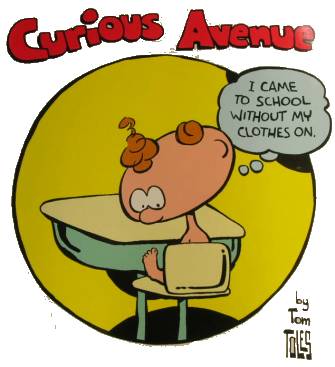 Comic Strip Books
Comic Strip Books
Again, this is an extraordinarily broad category, with hundreds of books to buy from dozens of cartoonists. Comic strip paperbacks were a stable of new bookstore humor sections for several decades and can be found in almost every library sale or book show coast to coast. I tend to focus on three areas. First, I enjoy picking up the collections of 1960s comic strips like
Tumbleweeds,
Andy Capp and
Wizard of Id, funny strips that became less funny later on and that because their artists came from gag cartoons the reproduction at a smaller size in these books tends to flatter rather than distort their work. Second I'm also fond of collecting -- if they're really cheap -- books that I have in more serious form elsewhere but just like the formatting of the older volumes. I really love how
Doonesbury was collected in the 1970s by Holt, for instance, before switching to a larger, multi-color format of which I'm much less fond. Third, used bookstores are a great place to pick up strips that didn't quite hit on the national level, like Tom Toles'
Curious Avenue,
Sam Hurt's Eyebeam and if you're really lucky
William Overgard's exquisitely odd
Rudy (collected as
Rudy in Hollywood). I suppose suggesting you round up books made redundant in other parts of your collection may work against this post's anti-recession usefulness, but there's a treasure of material out there, and I love reading strips this way.
*****
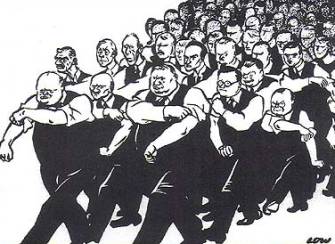

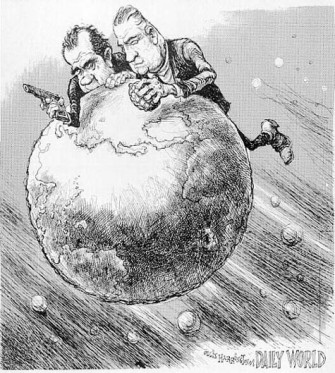 Editorial Cartoonists
Editorial Cartoonists
Like comic strips, this is an enormous category but one that I think yields a lot of great results in used bookstores as opposed to merely collecting this material new. I split it up into three categories: older editorial cartoonist like Enemy of Hitler
David Low, more modern editorial cartoonists such as the late
Herbert Block, and less-published editorial cartoonists like
Oliver Harrington. Almost every editorial cartoonist of note has had work featured in an accessible bookstore-ready format, if only for purchase at the local or regional level, so be diligent in your searches and you'll likely come up with something. Even in the case of someone like the much-published Herblock, I think the opportunity is for the books with more modest publishing aims, those that seek a snapshot of a year or time as opposed to some sort of broad take on someone's entire career. There are also, of course, compilations and best-ofs out the wazoo. I'm afraid I don't care for those, but you might.
*****
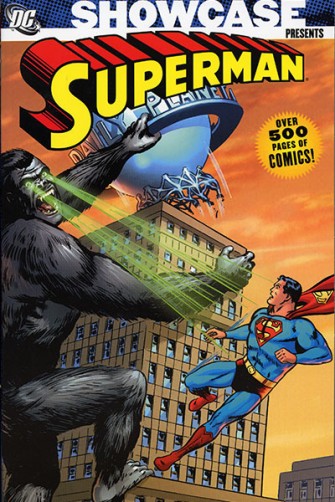
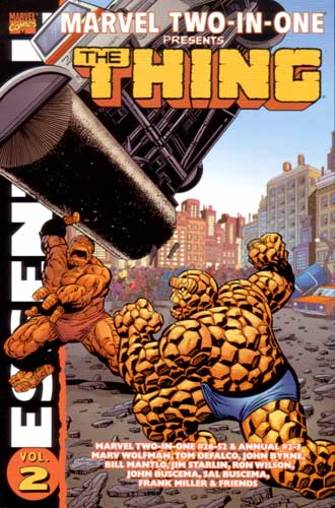 Marvel And DC Comics Cheapies
Marvel And DC Comics Cheapies
While I've stayed away from material that can and I hope will be purchased in the world's great comics specialty stores, I do have a great deal of success finding individual volumes of the mainstream companies' cheapo lines (Marvel's
Essential; DC's
Showcase Presents) through these sites and in these places. I wanted to mention that here because unlike a lot of the great comics out there, these books function more like used books than as collectibles. If you're buying some
Werewolf By Night comics in black and white and with some dodgy reproduction as might be the case with a brand-new volume of the collected version, I can't imagine you're going to freak out too much about some wear on the spine.
*****
*****
posted 8:00 am PST |
Permalink
Daily Blog Archives
November 2019
October 2019
September 2019
August 2019
July 2019
Full Archives


